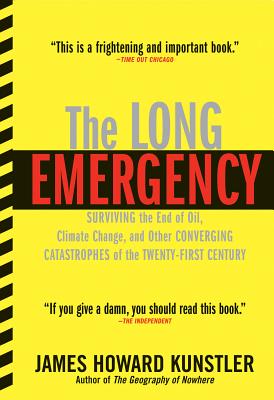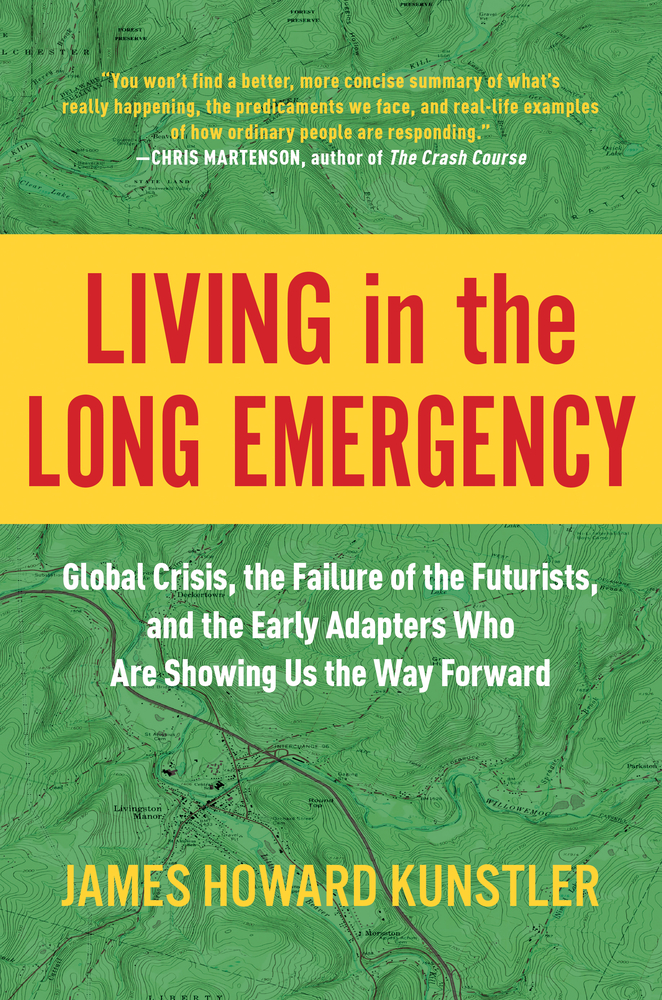It is broadly true that political writing is bad writing. Where it is not true, it will generally be found that a writer is some kind of rebel, expressing his private opinions and not a “party line.”
—George Orwell, “Politics and the English Language”
A very great fool once called James Howard Kunstler a “Malthusian hack.” Kunstler is nothing of the sort.
Unlike the very great fool, Kunstler no doubt gets a few things wrong, but for many years now he has been a pretty clear-eyed critic of the perishing Republic, not to mention an entertaining one. In this he answers to the first commandment handed down to all of us at birth: “Thou shalt not be dull.”
And I would add that Kunstler has been an important moral critic too. More on this later.
He calls things by their right names, including fools, spades, and the swindling swine who swap mortgage-backed securities; he gores oxen, puts bells around the necks of cats, and for added measure registers an impressive impatience with two of our most ubiquitous abominations: bad architecture and bad civic design.
And Kunstler has the benefit of being unaffiliated: no academic provost is going to call him in and scold him for failing to kiss the over-puckered glutaei of the approved political figures. Kunstler’s not going to be put on temporary leave for saying something that an alleged rube from Mayberry RFD not yet converted to The Truth by Sociology 101 will find both reasonable and agreeable.
A Reagan Democrat who twice voted for Obama, Kunstler is no great fan of Mr. Trump’s, but of late he has marveled relentlessly on his blog, Clusterfuck Nation, that the Democrats, having abandoned their plans for mere suicide, are now intent Ahab-like on taking down the whole country with them, recklessly deflating the currency and writing checks against capital that doesn’t exist, Uncle Joe’s hologram—or is it his well-preserved corpse?—leading the way.
“There’s a lot to not love about Mr. Trump in his persona and manner,” Kunstler wrote back in July. But
there’s a great deal more to fear about the prospect of Democratic Party control of government. Their enmity to free speech cannot be doubted after a decade of promoting cancel culture. Their appetite for coercion is at odds with the Bill of Rights. Their bad faith and dishonesty have been on display through all the concocted melodramas of RussiaGate and its offshoots. Their economic program is a mashup of all the failed central planning regimes from the bygone 20th century and is wholly inconsistent with the new imperatives to downscale and re-localize the real productive activities of daily life in this country.
(Later he said he still views Trump as the “designated bag-holder for the catastrophe of our economic quandary, but his political opponents would surely make things worse with their crypto-Marxist fantasies of a totalist American nanny-state.” And then he delivered himself of his Bill of Particulars, which those who, like me, cannot vote for Mr. Trump might do well to consider.)
So there you have it. Imagine a member of a university faculty writing this and still finding that his or her—or their—keys still work the next day. This is not a party member meeting his Brocken Spectre. This is Kunstler asking whether we ought to be charging toward the point at which The Fed can no longer pay the interest on its loans, party loyalties be damned. For whereas ordinary working folk manage their own finances in order to avoid bankruptcy, their putative champions, by contrast, the insulated leaders in the party of the nouveau riche, are far less timid about its consequences.
Where have you gone, Joe Bageant? Our nation turns its lonely eyes to you.
From the core of Kunstler’s broader diagnosis dating back to The Long Emergency, which appeared fifteen years ago, comes this warning: we’re heading into an era in which a whole array of living arrangements built by cheap oil to run on cheap oil won’t have the cheap oil necessary to keep on running. Oil, the most indispensable commodity of industrial capitalism, is in steady decline, and no combination of any alternative energy sources is going to rescue us once the oil fields dry up—or, what is more likely, once the energy return on investment (EROI) reaches 1:1. (Once upon a time a barrel of oil could get you a hundred barrels; now it gets you about 15, and that number keeps falling.) Because no one in the marbled halls of power and commerce, and few among the shopping masses, seem particularly worried about this, Kunstler has said over and over again that we are “sleepwalking into the future.”
I say nothing of the clueless (but acceptably diverse) sleepwalking journalists who daily take dictation on All the News that’s Fit to Invent.
“Happing Motoring” will not continue, and suburbia, the “biggest misallocation of funds in the history of the world,” is done for. Because oil pretty much runs it all, and because the oil is dwindling rapidly, it follows that the day is coming when almost nothing will run, at which time we will have to rename every suburb “Shit Creek”—even those suburbs unironically memorialized as “Warbling Streams.”
A paucity of paddles along Shit Creek might exacerbate the problem, except that the clueless denizens alongside it will have forgotten what paddles are for or what they look like or how to use them, all thanks to oil, which taught us that shopping could permanently replace basic skills.
The twin delusions of (1) infinite economic growth and (2) the availability of infinite energy supplies, both apparently possible on a finite planet, point to a powerful and pervasive stupidity that almost everyone except maybe the Amish have been duped by. Whereas the Amish are the very picture of “many hands working at something together,” which “used to be one of the consolations of rural life,” those who let the oil-dependent machinery and fossil-fuel-dependent chemicals do their work for them will be left without the fundamental skills and knowledge necessary for surviving in the Long Emergency.
And even as I write these words we are all of us apparently living out the horrors of Lord Byron’s “Darkness,” perpetuating a herd mentality we don’t need and slowing down a herd immunity we do need. Which is to say we are living in the wrong emergency.
It bears saying that in The Long Emergency Kunstler divided the diagnosticians looking into the future into two crowds. On the one hand, he said, there are the Cornucopians, who think the world has a creamy nougat center, that everything will be fine, and that if there is any serious mischief—such as an inability to run civilization as we’ve been running it—someone will think of something: for example, a massive gerbil farm where a race of bionic super-gerbils, running in their exercise wheels, generate enough electricity to power electric bulldozers and electric rocket ships and the screens that anesthetize their operators into a nearly indescribable unpreparedness (although I should note that Kunstler’s world-made-by-hand novels have done a decent job of describing that unpreparedness).
On the other hand there are the Die-Offs, who think civilization is racing through a thick fog toward a bridge it can’t see, and the bridge has just been monkey-wrenched to smithereens, which means down goes the omnibus of civilization. Few survive, as in a scenario out of James Lovelock’s imagination.
Kunstler placed himself somewhere in the middle but leaning a little toward the Die-Off side of things. He manifestly does not think the world has a creamy nougat center.
Living in the Long Emergency is the third book in what I will call the Catastrophe Trilogy. The Long Emergency (2005) was followed in 2012 by Too Much Magic: Wishful Thinking, Technology, and the Future of the Nation. This second book rehashed some of the material in The Long Emergency in a manner that this latest book does not, but mainly it took up the problems that attend the diminishing returns of technology, the “psychology of previous investment” that girds a Pollyanna-like faith in progress, and “a species of wishful thinking that resemble[s] a primitive cargo cult.” This wishful thinking, as Kunstler almost needlessly pointed out, had “gripped the technocratic class.”
His new book is governed by three purposes: (1) to discusses what Kunstler got right and what he got wrong in the first two books (he didn’t get much wrong, and the case could be made that he got nothing of any real significance wrong); (2) to present “portraits” of people who are what he calls “early adapters” to the long emergency; and then (3) to answer the book’s governing question: “now what?”—a question he asks of each of the “early adapters” he profiles in section two, each of whom provides an interesting answer that lends the book a useful polyphonic richness. “The objective is to stimulate the formation of a coherent consensus about what is happening to us so we can make coherent plans about what to do.”
Which, not surprisingly, the technocratic class is not interested in doing. It’s too busy getting rich on an incoherent consensus that has no future.
But consider this: as the price at the pump drops and membership quadruples in all of our many therapeutic organizations, including the Fraternal Order of Whistlers-in-the-Dark, there are very few signs that anyone understands the trouble that passing peak oil production portends. It is true that the domestic peak didn’t occur in 1970, as Kunstler previously had reported, but it is altogether likely that peak production finally has occurred. When? When “fracking” and the shale-oil boom boosted production beyond that 9.6 million barrels-per-day mark and rendered the United States “energy-independent.”
Except these ventures did this for about the duration of an Augenblick. These “stunts,” as Kunstler calls them, gave us a window of energy independence, but only until they had consummated like Thumper in the Bunny House. Now the Bakken field is despoiled, its groundwater poisoned, and the new shale stores are pretty much exhausted. It turns out that the party was over almost as soon as it started. We got a lot more sleep-walking time from the Alaskan north slope and the North Sea explorations, which provided us with temporary therapy after the oil embargo of the 1970s had put everyone except Sammy Hagar into a drive-55 panic.
So Kunstler got peak oil wrong—or did he? Fracking and shale-oil merely offered a new variation on an old theme: hitting the snooze button. A more reasonable way of looking at this is simply to say we’ve had twin peaks. But the crisis has not gone away—and it’s not going to go away. We’re still headed toward a world made by hand that we’re going to have to navigate in living arrangements made by oil.
Why then the low prices? How come I’m still paying only about half what I paid in 2008 or 2012 for the life-blood that runs my semi-armored suburban tank?
Kunstler argues that the oil boom during this second peak was made possible by inordinately, not to mention unsustainably, low interest rates, without which the exceedingly expensive shale-oil and fracking adventures would have been unthinkable. The oil companies would never have undertaken these escapades had money not been so cheap. What they’re actually doing right now is throwing themselves a “retirement party.” They’re in the final act and they know it, and now they’re finding it difficult to sustain the profits that they’re accustomed to.
And so the US is caught in a predicament that can be stated pretty simply:
oil over $75 a barrel crushes economic activity, and oil under $75 a barrel bankrupts oil companies. The price[-]leaps of the early 2000s from $20 a barrel (what an advanced industrial economy could afford to run on) to over $150 in 2008 substantially damaged the US economy in ways that have never been fully accounted for in the news media. It was certainly a major factor in the Great Financial Crisis.
Not surprisingly, the news gets worse. The oil from shale is low-grade. It can’t be refined into the heavier fuels needed to run diesel engines and the big ol’ jet air-a-liners that our elites live in. This means that much of the domestic product has to be shipped out to be blended, at better foreign refineries, with higher-grade stuff.
It’s not difficult to see what’s going on here: oil companies haven’t invested in new and better domestic refineries because they know that, even in this hour of essentially free money, their profit margins are shrinking and there aren’t 30 years of crude in the ground to pay off 30-year mortgages on new refineries. The oil companies are in a “sunset industry” and they know it.
(It’s also worth noting that they’re not getting into the alternative-fuels business. This is because, accomplished in the rigors of greed, they’re good at seeing where the money is—and isn’t.)
In fine, the EROI in Kunstler’s retrospective is nearer that 15:1 mark than 100:1. Brace yourself for the coming insanity. Will it be the accelerating depletion of 4:1? 3:1? Don’t bet against sentient beings seeing it drop to 1:1 and still saying “Drill, Baby, Drill!”
Much of your own EROI will get you into Kunstler’s analysis of what is called Modern Monetary Theory, which he does not name explicitly except to call it a kind of financial hocus-pocus. But MMT seems to be what he has in mind when he undertakes to comment on the economic recovery scam and the pixie dust being thrown into the eyes of the middle class. The scam is characterized by middle-class losses that continue apace even as the stock market produces high cotton.
Well, high paper cotton.
The investor class in whose favor the system is rigged, having footed the bill for no grease whatsoever, continues nevertheless to tell the rest of us to grab our ankles. And we keep doing it. Meanwhile, our Potemkin economy has no actual goods to show for itself, only pixels. Now would be a good time to find out which herbs and spices taste best on your unused checks and worthless Andrew Jacksons. On Kunstler’s account that also goes for such alternative currencies as Bitcoin, which is “backed by nothing” and bedeviled by value-fluctuation. “Gross instability is the last thing you want in something vying to be a currency.”
You don’t have to be Young Goodman Brown (his “dying hour was gloom”) to be drawn to Part 1 of this book. The Boy Scout gene in you—“Be Prepared”—will do it. The same goes for Part 3, in which Kunstler luxuriates in some of his favorite topics, which I’ll mention rather than discuss: climate change, food production, extinctions, the papered-over economy, political disarray, and the illiberal intolerance that the doctrine of liberal tolerance invariably leads to, especially among the true sleepwalkers, the ironically named “woke.” Given all these, what now? That’s the governing question. What do we do? To his credit Kunstler also pays due notice to the possibilities of a “low-grade civil war.” Let’s hope it’s only low-grade and not Spanish-style.
It is on account of such conjectures that some think Kunstler is simply thumbing a ride from a pervasive apocalypticism that can be reliably counted on to remain in the air, given the mind’s tendency to go looking for trouble, like a tongue to a sore tooth.
For sure he has a shtick, but saying that he has a shtick is simply a way of avoiding the point. And bear in mind that long before people started blowing up buildings and flying airplanes into them Walker Percy said this:
It has often seemed to me that much of the violence and alienation of today can be traced to a secret and paradoxical conviction that America is immoveable and indestructible. Hence the acts of desperation. Blowing up a building is, after all, a nutty thing to do. The fact is that America is not immoveable and indestructible.
That was in the 1970s, in advance of Percy’s apocalyptic comedy Love in the Ruins.
I expect many readers will find Part 2 the least interesting section of this book, mainly because it is comprised of the kind of thing that John McPhee excels at, whereas Parts 1 and 3 are comprised of the kind of thing that Jim Kunstler excels at. But Part 2 is both interesting and valuable, interesting if for no other reason than that it includes a portrait of a white supremacist—whose views, it should not need saying, Kunstler manifestly does not share—and valuable inasmuch as it includes profiles of a distiller of spirits, a bread maker trying to keep a small business viable, and several other “early adapters” who know that the time has come to scale down and localize. What Kunstler is in search of here, political affiliations be damned once again, are people who are not so much reacting against as adapting to the changes both afoot and coming. They know that this charade can’t last; they are preparing for a future in which there is no more Happy Motoring and people finally realize that the earth doesn’t have a creamy nougat center.
The point Kunstler makes in these portraits, which are spun out of his visits with these early adapters, is that there are people preparing for the long emergency, and that their preparations are evidence of (1) a growing conviction that life as we know it can’t go on, and (2) an abiding sense that life as we’ve found it isn’t interesting. For, in fact, it isn’t. I leave this section—call it practical if you will—merely hinted at. I won’t provide any spoilers—except maybe to say that the white supremacist seems to provide ballast for Kunstler’s momentary desertion from the Democratic party or, rather, his momentary tolerance of Agent Orange and the malodorous Republican ticket before us. You can’t say Kunstler is a party man or a retained flatterer. He is Orwell’s “rebel, expressing his private opinions and not a ‘party line.’’’
There’s more for the ride in Living in the Long Emergency that I’ll only mention briefly. One is the “alt-energy freak show” gathering itself about the spinal column and culminating in the brain stem known as Elon Musk, who, like Jeff Bezos and other rich tech gurus, is at leisure to indulge his high school fantasies of taking this show to Mars.
Because, you know, colonization outside the possibilities of human habitation is not a sign that the first departure—from reality—has already taken place.
“But the Mars colonization does raise a sticky question,” Kunstler modestly points out.
If the human race can’t get its shit together on Earth, how might we possibly thrive on a distant planet with an atmosphere that is 95 percent carbon dioxide, has little protection against space radiation, no visible aboveground water, nor any of the geophysical and biological characteristics that support life here, and which, finally, is a 33.9-million-mile resupply journey at its closest?
Another bonus feature is something Kunstler never seems to tire of: warning against spending too much on complex systems, and that includes our aging grid. Let us not forget our aging—and centralized and therefore fragile—grid.
Our overspending also includes The Latest Thing, AI, which is “the epitome of lethal overinvestment in complexity with diminishing returns. Can we, please, not venture into trans-human monsterdom?” Those afraid we might so venture can take some comfort in Kunstler’s view, which is that economic collapse will win the race against AI. Economic collapse is “Earth’s way of defending itself against a kind of fatal insult to the planetary organism”; it will prove to be “a necessary corrective to a case of Faustian recklessness.”
And, at any rate, “if AI was truly intelligent, as we understand intelligence, it would shut itself down.”
Here’s another: Kunstler sees no future for a Green New Deal such as has been suggested by sorority girls in the House of Representatives: “The sun may shine a lot of the time (in some places anyway), and the winds may blow (ditto), and they may indeed be eternal features of Earth’s geophysics, but the hardware necessary to capture that energy is not renewable. It’s a product of a fossil-fuel economy, and we have no experience fabricating this hardware any other way—most particularly via renewable energy sources. And certainly not at the scale required for a vaunted ‘Green New Deal.’”
For, finally, Kunstler has sounded a note he’s sounded before, which has sometimes fallen on ears that work but mostly on those that don’t: no one is questioning the basic assumption that what we’re doing is going to continue. The thing is to keep what we’ve got going by whatever means possible. But what if what we’re doing can’t continue by any means? What if the children born this week are going to die into a world much more like the 1850s than the 1990s? And (more to the point) will anyone be able to teach them what they need to know?
What if we are moving into a period of energy and resource scarcity, capital scarcity, population contraction, and relative hardship? … Wouldn’t it make sense to teach young people manual skills, to train them as artisans? And by that I don’t mean artisans in the fey sense of boutique consumerism; I mean preparation for a world where it is crucial to know how to make things after mass production fails, a world without social safety nets.
This gets nearer the point of Kunstler’s moral criticism that I mentioned at the top. To those who think he’s been sneering from some privileged point of view I would say this, and say it emphatically: Kunstler has insisted all along that we must figure out ways to be useful to one another, that we must learn how to be good neighbors, good citizens (not good consumers), and that we must enter vocations that serve the common good—the local common good. The Long Emergency is going to require not the sanctioned acquisitiveness and self-actualization that our schools and colleges and universities have taught us to indulge in, not the living out of “lifestyles” as free and loose individuals, but rather the selflessness without which we cannot sustain the human project of civilization. Acquisitiveness has had its day, and it has failed miserably. And so, by the way, has the surrendering of literacy and a common culture. The time of going to college so you can participate in Student-Life-sponsored retreats to decide whether you’re going to stand or squat while peeing is limited. Soon we might not even be able to afford irony. Now is the time to take up vocations, to serve something other than that restless bundle of desires known as the autonomous and isolated self.
And speaking of not surrendering literacy or a common culture, this last point was stated fairly plainly by the prophet Jeremiah, whom a few people have heard of: “And seek the peace of the city whither I have caused you to be carried away captives, and pray unto the Lord for it: for in the peace thereof shall ye have peace.” (That’s from the once-influential anthology called “The Bible.”)










7 comments
dave
I don’t know, seemed both a book review and a demonstration of how to use a book to whack a few people on the head. Page count and hardcover or no valuable reporting for the second case; larger tomes not necessarily more effective, a tightly rolled pamphlet can be surprisingly useful.
Odd to see the United States fall not to external enemies but from internal division. Odd to witness, I should say. Thought it would take longer. Breaks things, they did.
John
Good essay with some challenging content for a leftist like me. Way to debase it with a trans joke and sorority girls reference, though. I hope we have a better future than Kunstler believes is possible but I read him to prepare for what could easily come to pass. I’m sure my critique of your condescending and sexist tone will simply reinforce your views about the left, but someone’s gotta say it.
Martin
I enjoyed Jason’s long and entertaining ramble but I agree with Brian that the peak oil panic is tiresome. There’s not a lot of risk in predicting doom when life appears to move along with continuing material prosperity. True, most people are not alert to the hollowness of it except when confronted with credit card debt.
But I submit that Jason is asleep in a way, too. Yes, WSJ rightly pointed to an EROI ratio <1 for biodiesel as far back as 2008, but biofuel still attracts investors around the globe. Fly over Sumatra and you'll see palm oil plantations for hundreds of miles. However, EROI is too narrow a concept to fit the situation.
Consider by analogy the cost of growing rice in Japan, which is subsidized to support farmers and ensure a stable supply even though imported rice is cheaper. The issue is termed "food security" and trumps the simplistic neoliberal meme of calculating the cost of everything as an individual item, disconnected from key issues that are not framed in terms of money. Jason actually hints at this in his sardonic comment about putting seasoning on paper money in order to eat it.
I'm reminded here of the key fallacy of The Matrix, which is that human beings are like batteries and produce more energy than we consume, second law of thermodynamics notwithstanding. But that was fiction, so a little sleight of hand with fake energy calculations got a free pass.
I'd also like to point out that WEF's web site touting the Great Reset supports hydrogen cars instead of electric cars, so oil consumption will continue. (BTW, that web site fails to suggest reductions in warmongering as well as greed by banks.)
Finally, my two cents of prediction is that the oil industry is, ironically, going the way of the dinosaur. The new vertebrate on the scene is biotechnology, which stands to triumph immensely in terms of money and power due to SARS-2 virus.
Brian
The whole peak-oil thing is such a blast from the past, isn’t it?
He seems on better ground when showing how it’s tied in to economic collapse, though. Remember when that was a big deal pre-Obama by each party when out of power but since the Tea Party was crushed by the establishment of both sides it’s clear that no one really cares, either in or out of the system.
And JHK passes the main test of our time, in recognizing that the CIA/FBI being used to attempt to destroy an opposing presidential candidate and then administration is the primary clear and present danger. There are very, very few commentators who pass that test.
Brian D Miller
Geeze, for my reading pleasure I get both the Red Rocker and JHK in the same paragraph. What a morning! Good to see Kunstler get his due. I’ve read him for years. Enjoyed, even while I wrestled with his unorthodox opinions, not that I always disagree. But being blinkered in my harness I can’t see if anyone else is nodding in agreement.
Yet, in my opinion, this review falls short. Because one of the gratifications in reading Kunstler is the casually lobbed comic grenade of a sentence that leaves one in stitches (an analogy that seems more on target than usual). That skill certainly deserved some space in this essay. Although the author may simply not like the competition as he tosses his own over the barricades: “Now would be a good time to find out which herbs and spices taste best on your unused checks and worthless Andrew Jacksons.”
James Howard Kunstler
Hey, I finally got to see this review — some blog reader sent it to me — and I’m grateful for any reviews in this new age that includes so little book-reviewing… so thanks to Jason for his thoughtful essay and the props in it. As to the comment above, I must say that over the many years of my career the professional auditors ‘out there’ have consistently overlooked the comedy I work so hard to produce. Sigh….
Martin
I’m the guy who called Jim’s attention to the review in a private email.
Comments are closed.